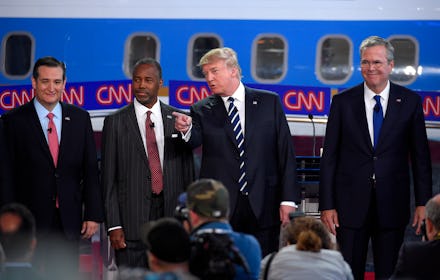2016 Presidential Election: Where the Top Republican Candidates Stand on Taxes

Dubbed "Your Money, Your Vote," Wednesday's third Republican presidential debate hosted by CNBC at the University of Colorado Boulder will focus on hot-button economic issues — jobs, technology, retirement, taxes and the general health of the United States economy, according to CNBC.
Moderators are expected to press the Republican candidates on their economic policies, including tax plans, CNBC reports. Here is an idea of some of the top candidates' tax plans:
Real estate mogul Donald Trump: The front-runner wants to make major income tax cuts for the wealthy and allow those in lowest income brackets to be exempt from paying them at all. His plan would allow singles making $25,000 or less and couples making $50,000 or less to pay zero income tax, while cutting income tax for the top income bracket from nearly 40% to 25%.
Both the left-leaning group Citizens for Tax Justice and its conservative equivalent Tax Foundation agreed that the ambitious plan comes at a steep price — roughly $10 trillion over the next decade. In an interview with CNN, Trump campaign manager Corey Lewandowski insisted the plan is "revenue neutral" under the economy's projected growth rate.
"We project at a 3% growth rate that this plan is revenue neutral," he said on CNN's Situation Room. "If we're fortunate enough that the economy of this country continues to grow, which we think it would under this plan, ... then anything above a 3% growth rate, which is a very modest growth rate, would allow us to continue to reduce the deficit."
Former neurosurgeon Ben Carson: Carson dissed Trump's plan for not making the lowest income bracket pay at least some taxes, telling CNN in September he firmly believes that "every American should pay something" because "we're all Americans, and we all have the same rights and responsibilities."
Carson supports a flat tax of 10% for all income brackets, saying on Fox News Sunday in May that his plan was inspired by tithing, the Biblical concept that people should give one-tenth of their belongings to God.
"It's very condescending to say that poor people can't pay at the same tax rate as the wealthy," he told CNN. He defended the plan at the first Republican debate by arguing that "God is a pretty fair guy," Time reported.
Texas Sen. Ted Cruz: Cruz also supports a flat-tax — and getting rid of the IRS. Cruz asserted the U.S. should abolish the IRS, flatten tax rates and simplify the tax code, the Washington Post reported in March.
While at a Texas winery in July, according to a blog post, Cruz said Americans spend $500 billion a year doing taxes. "Every year we spend roughly $500 billion on tax compliance," he said, according to Texas Wine Lover. "That is roughly the budget of our entire military, entirely wasted on tax compliance."
However, Politifact has examined this claim and deemed it false. Cruz got that number from a 2012 chart posted to the Washington Post's "Wonkblog," which used information from the Center for Strategic and Budgetary Assessments, Politifact reported. A center analyst, Todd Harrison, told Politifact that number is only the military's base budget, excluding the cost of veteran pensions and benefits, to fight conflict and to upgrade nuclear weapons. "If you count those other expenses," Politifact wrote, "Harrison said, the U.S. spent $866 billion on the military in 2014."
Cruz then repeated the plan he vaguely proposed on Facebook. "I agree with you we should move to a simple flat tax where everyone can fill out their taxes on a postcard and that we should shut down the IRS," Cruz said at the winery. "There's no reason to have 120,000 employees in Washington targeting the U.S. citizens."
Florida Sen. Marco Rubio: Rubio rolled out his tax plan last spring, and it contains some interesting diversions from standard conservative orthodoxy. Rubio's plan, proposed in collaboration with Sen. Mike Lee (R.-Utah), does not include across-the-board cuts but rather a mix of income rate cuts and new tax credits, Tax Policy Center reports.
The plan would introduce a tax credit for middle-class families with children and 15% income tax for those making less than $75,000, Forbes reports. It would also lower the income tax for those making $75,000 or more from 39.6% to 35%, according to the report, while eliminating taxes on capital gains, interest and dividends and cutting business taxes, which means the wealthy would benefit a lot more.
Florida Gov. Jeb Bush: Bush's tax plan would cut taxes across the board but mostly for the highest income bracket — reducing it to 28% — doing away with estate tax and reducing corporate tax to 20%. These cuts would lower taxes for the wealthy to something comparable to what existed during President George W. Bush's administration, per the New York Times.
Bush's plan would cut taxes for all income groups by nearly doubling the standard deduction rate. The poorest 20% would receive, on average, a $227 cut, the Citizens for Tax Justice reports, while those in the highest bracket would receive $82,392 in cuts, which is roughly 53% of the entire plan's proposed cuts.
Former Hewlett-Packard CEO Carly Fiorina: Fiorina wants to reduce taxes across the board and eliminate loopholes, telling Fox News in August that they only benefit the wealthy.
While Fiorina hasn't laid out an explicit tax plan, in April she posted a statement to Facebook proposing "zero-based budgeting" and "simplify[ing] the tax code."